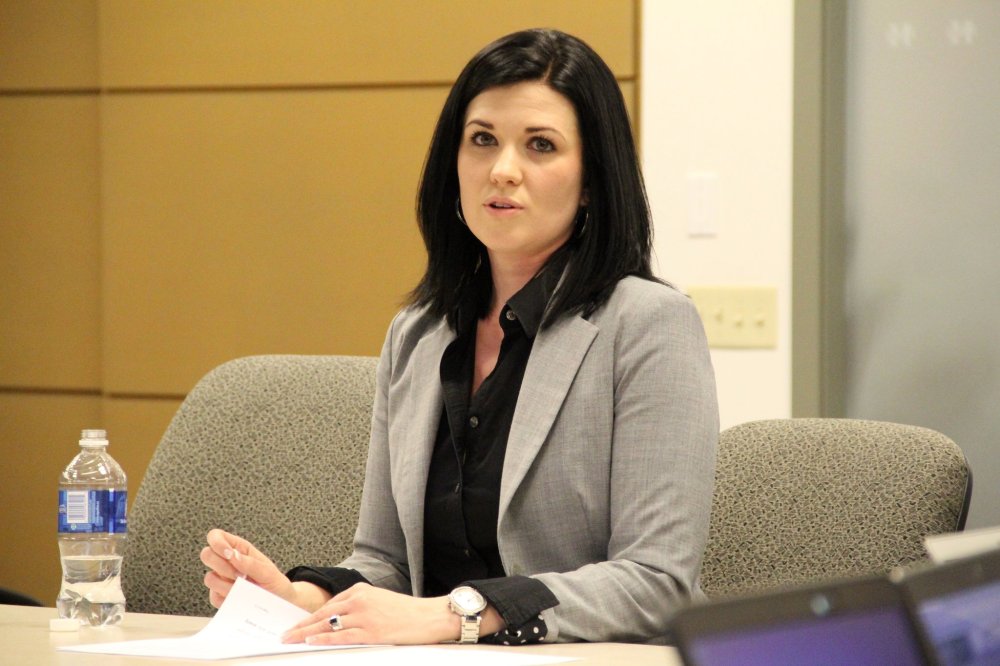Mom asks HSD to talk homosexuality in class
Advertisement
Hey there, time traveller!
This article was published 05/04/2016 (3151 days ago), so information in it may no longer be current.
A mother told the Hanover School Division’s board of trustees Tuesday that refusing to teach middle-school students about sexual orientation and gender identity fosters a discriminatory environment.
Michelle McHale, whose child has been bullied for living in a household with two mothers, explained to trustees the division is excluding a minority group by not acknowledging that people can have different sexual orientations until high school. She described the practice as a form of discrimination because a group is being treated differently on the basis of protected characteristics.
“Staying silent about LGBT information alienates the children who themselves identify as LGBT and also alienates the children whose parents identify as LGBT,” said McHale.

She said in recent months the bullying her middle-school child endured prompted McHale to talk to administrators to stop the bullying. Through these discussions, she discovered HSD has internally informed its staff to not discuss topics like same-sex relationships but also to make clear the division respects everyone.
As part of her presentation, McHale asked HSD to adopt a policy similar to the Winnipeg School Division’s diversity and equity education policy, which ensures that curriculum and instruction demonstrates an acceptance of students from all backgrounds, including sexual orientation.
Trustee Cyndy Friesen thanked McHale for her courage upon her speech’s conclusion. Superintendent Randy Dueck said in an interview the board will consider McHale’s proposal.
“Any time there’s a student who has been bullied, we’re concerned about that,” he said afterwards. “We care about the kids who are in our schools, and we want to provide an absolutely fantastic learning environment for our kids.”
Dueck explained the division is adhering to the flexible provincial curriculum in how it broaches homosexuality in the classroom.
There has been a fraught relationship between the communities in the Steinbach-based school division, where the furor over the provincial anti-bullying bill in 2013 protecting gay-straight alliances was most acute, and LGBT individuals. A prayer meeting in Steinbach against Bill 18 drew 1,200 people.
McHale spent most of her life in the region and is aware of this historical conflict, but said accommodating a religion cannot infringe on the rights of another.
“Excluding LGBT information from education because individuals have a belief based on religious doctrine, that a sexual orientation other than heterosexual is wrong, is discrimination,” said McHale.
As a result of Bill 18, school divisions like HSD passed a human diversity policy explaining they would not discriminate due to a range of characteristics, including sexual orientation. Based on her family’s experiences, she explained this document is lacking.
“It’s not enough because conversations about people like me, a parent of a child in this school division, are being left out of the classrooms because of sexual orientation,” said McHale.
She also expressed concern with how same-sex relationships are addressed in the HSD’s sensitive concerns document, which recommends how staff members should address sexual orientation, abortion and masturbation when it comes up before high school.
“Sexual orientation is lumped into a category with masturbation and abortion—things that you can choose to do, or choose not to do,” said McHale. “Sexual orientation and gender identity are not choices. These are innate characteristics of a human being.”
In an interview with The Carillon before her presentation, McHale said the bullying in school got to such a point her child said they didn’t want to be in a homosexual environment.
“It’s heartbreaking,” said McHale. “I can’t fault (a kid) at that age for feeling that, kids want to fit in.”
McHale explains she struggled with coming to grips with her sexuality. She didn’t recognize her attraction to other females growing up. She married a man, had kids and it was not until her early 30s until she made sense of her sexuality.
“Once I figured it out, I was closeted with it for a long time because it’s scary to think about what the world at large will do or say or how you’ll be perceived or accepted.”
Those fears subsided once she got to know her partner Karen, who McHale has been together with for about three years. “It didn’t matter anymore because of the connection that I had found with Karen,” explained McHale.
Now, she’s in a fortunate place, she says, to speak up for families like hers—even if it generates a backlash.
“I think it’s important for the kids who are trying to figure it out and can’t, I think it’s important for the kids who have killed themselves trying to figure it out,” she said. “I’m in a position where I see something happening and it’s not OK.”
